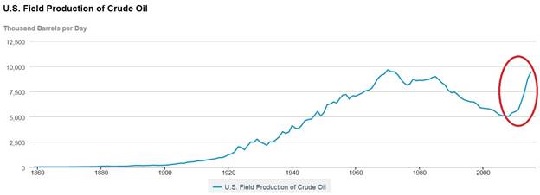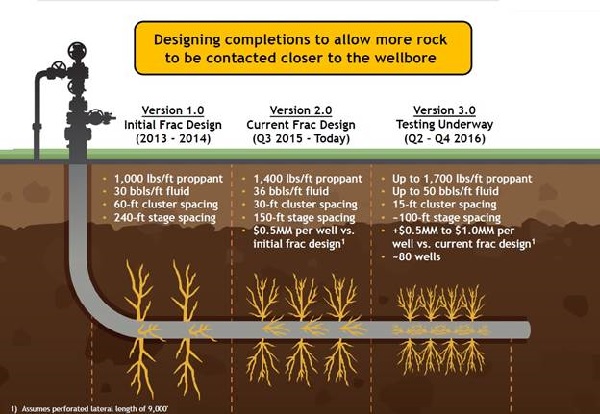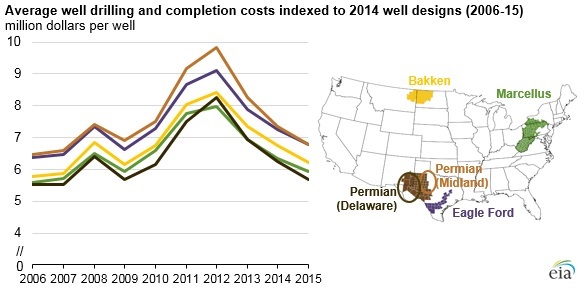We have written often in these pages about the significance of the technological revolution that has occurred in U.S. oil production since the development and widespread application of horizontal drilling and hydraulic fracturing, or “fracking.” That revolution has disrupted global energy markets, with the flood of U.S. shale oil helping further break the hold of OPEC. The sharp upswing in U.S. oil production since 2006 reversed the long decline that had really only paused, not reversed, with Alaskan oil discoveries and production in the 1970s.
Source: U.S. Energy Information Agency
The point we want to make today is that this technological revolution is not over: it is ongoing, and it is helping continue to drive costs lower for U.S. oil producers.
This is noteworthy because fracking is becoming more complex. Last year, Pioneer Natural Resources (NYSE:PXD) described the evolution of their fracking techniques.
Source: Pioneer Natural Resources Investor Presentation, May 2016
As fracking has developed, it involves more proppants (materials such as sand, which help keep open the cracks that fracking generates), more fluids, and more (and more closely spaced) fracks.
In spite of that increased complexity, technical improvements continue to drive down the cost of production.
Source: U.S. Energy Information Agency
While there is a tug-of-war between increasing drilling complexity and rising efficiency and productivity, the latter is winning out. The U.S. Energy Information Agency (EIA) recently noted:
Upstream costs in 2015 were 25% to 30% below their 2012 levels, when per-well costs were at their highest point over the past decade. Changes in technology have affected drilling efficiency and completion, supporting higher productivity per well and lowering costs, while shifts towards deeper and longer lateral wells with more complex completions have tended to increase costs… The adoption of best practices and the improvement of well designs have reduced drilling and completion times, decrease total well costs, and increase well performance. Greater standardization of these drilling and completion practices and designs across the industry should continue to lower costs. The drilling cost per foot, based on total depth, and the completion cost per foot, based on lateral length, are both projected to maintain these lower cost trends through 2018.
We would suggest that the EIA is being cautious in this assessment. It is likely that increasing technical sophistication will continue to push drilling and completion costs lower for U.S. frackers well past 2018.
In short: U.S. shale oil producers are not a flash in the pan, and particularly with a hydrocarbon-friendly administration in the White House, we believe that their disruption of the OPEC global oil cartel will be ongoing.
In a broader context, we believe that OPEC may succeed in cooperating long enough to help bring the price of oil somewhat closer to the levels they need to support social spending (and in some cases, stave off the risk of rebellion by an angry populace). When they do, it will only encourage U.S. producers further, as they will constantly be refining and improving their technology and decreasing their costs.
In addition, as we have written before, hanging over both U.S. and non-U.S. hydrocarbon producers, we see a “Sword of Damocles.” Frackers are not the only ones improving their technology. Renewables continue to gain ground, with renewable electricity generators approaching grid parity without subsidies, and battery technology and production both nearing inflection points. Together, these points make us bearish on long-term prospects for oil.
Investment implications: U.S. oil producers’ costs continue to fall, even in the face of more complex and demanding drilling techniques. We believe these efficiencies will keep improving, and even if OPEC and its allies manage to edge the price of oil higher, U.S. technical innovation will continue to challenge and disrupt global markets. Add in the ever-present specter of rapidly improving renewable technologies, and you have a mixture that is favorable for energy prices in the short term, because of the current economic backdrop of business expansion which promises increasing demand for hydrocarbons. However, after the current demand increases have flowed through the system, we are not bullish on oil prices in the long term.



